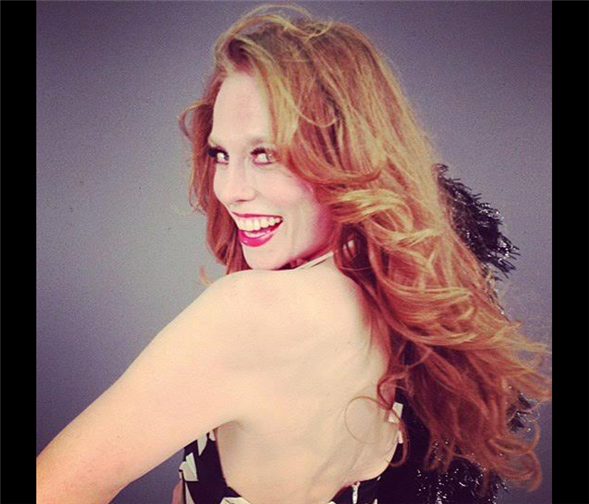Translate Page

With her new solo show, Heather Litteer takes on Hollywood typecasting
---
Heather Litteer's one-woman show Lemonade begins with the following lines: "I'm not a hooker, but I play one on TV. I'm a hooker , a hustler, a coke dealer too." She's not being facetious. Her IMDb profile includes character names such as Bored Hooker #1, Sandra/Hooker, and, quite simply, "stripper."
"I used to work in nightclubs and go-go dance and stuff like that, and I was getting these roles. Is this how people perceive me?" Litteer wonders.
To help her answer that question, she wrote Lemonade, her first solo show, running at La MaMa through April 24. Litteer is a mainstay in the cabaret and burlesque world, where her smoky voice and mane of lush, red hair have earned her the nickname (or as she calls it, her "drag name") Jessica Rabbit. She is also a member of Big Arts Group and has toured internationally in their experimental, multimedia work. But in the mainstream, she is known for her infamous role in Requiem for a Dream, directed by Darren Aronofsky. She only had one scene: a sex scene opposite Jennifer Connelly that, according to Litteer, is "voted online as the number one most horrific sex scene of all time."
"This sex scene is known all over the world, and it followed me around for years," she says. "Because I'm not a famous actor, I'm looking through a keyhole of not being an actress, but a whore."
Considering the current dialogue around the lack of women in Hollywood, both onscreen and off, Lemonade is especially timely. The main theme of the show is the way Hollywood objectifies women and typecasts them based on their perceived attractiveness. In one segment, for instance, Litteer reads the description of a character she played in Blood Ties, a 2013 film starring Clive Owen and Marion Cotillard: "Blowsy, Caucasian, prostitute. 30's. Getting a tad old. Redhead. Partial nudity."
"I took actual sides from film, kind of making fun at how these dialogues are written and how the descriptions of women are written," Litteer says. "It's really derogatory."
As a corrective, Lemonade's director, assistant director, and dramaturg are all women. "Being a sexual, powerful woman is great and with this piece; I feel like I'm taking this power back a little bit," Litteer says. "And I'm bringing up the discussion among women that there's nothing wrong with it."
Lemonade is part of La MaMa's ongoing commitment to solo performance. This spring, the theatre programmed four solo shows in a row, of which Litteer's is the final entry (as an offshoot of her two-year residency at the theatre). Programming director Nicky Paraiso notes that La MaMa's solo artists usually have a social justice bent to their work. "They are very socially aware of the world they live in," he says. "And it's not just, to go to the other extreme, a narcissistic pursuit. People think you do a solo performance because you want to become a star in your own right. But I think this particular generation of solo performance artists are very socially aware, and I think that's exciting."
However, it wasn't just the social commentary that attracted Paraiso to Litteer's script: It was also the personal touch. Beyond women in Hollywood, the show is also about the push and pull of a mother-daughter relationship. Litteer's mother, who lived in Georgia, is a character in the piece, and her conservative viewpoint is set in contrast to Litteer's edgier artistic pursuits. "Some mother-daughter relationships are a little bit trying," Litteer says. "She was hammering in all the Southern values all the time with me, and I was pushing back."
But while Litteer was writing the show, her mother passed away, in 2014. This gave the actress the extra drive she needed to finish the script. It's also why she chose to make it a solo piece, instead of a multi-person play. "It's very personal for me," she explains. "It's only been a year and a half since my mother died, and there's no one I could cast to play her. It's too close to home."
So Lemonade is an ode to female empowerment and to Litteer's mother. In fact, her mom is in the title. "One of the throughlines is to always have hope and to pick yourself back up again, and that's where Lemonade, the title, comes from, because [my mother] would say things like" – and here Litteer puts on a slow Southern drawl – "'We're just going to put all the bells and whistles on the dining room table,' or, 'Oh Heather Lynn, when life hands you lemons, you just gotta make lemonade.'"
---
TDF Members: At press time, discount tickets were available for Lemonade. Click here to browse our current offers.
Follow Diep Tran at @DiepThought. Follow TDF at @TDFNYC.
Photos by Steven Menendez.